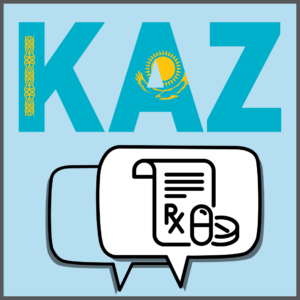
Kazakhstan has been planning the mandatory labeling of goods since 2016, initially for tobacco products and shoes. This was followed in 2018 by plans to implement mandatory labeling of pharmaceuticals. The corresponding Regulation No. KR DSM-11 was adopted on January 27, 2021. The Central Asian country planned to launch the labeling project on July 1, 2022. This was followed by a gradual introduction of track & trace regulations for prescription and OTC medicines. The deadlines have been adjusted several times. All current information on pharma serialization in Kazakhstan can be found in the following article.
Title: Introduction of labeling and traceability of medicinal products in the Republic of Kazakhstan
Competent Authority: Ministry of Health of the Republic of Kazakhstan
Central Notification System: Information System for Labeling and Traceability of Goods (IS MPT)
Products: All pharmaceutical products
Code Type: DataMatrix with Global Trade Item Number (GTIN)
Aggregation: Aggregation will be mandatory
What does the timeline look like?
For the publication of the regulations, Kazakhstan set July 1, 2022, as the deadline for the labeling of selected pharmaceuticals. As intermediate steps, 20% of Kazakhstan’s trade volume was to be labeled by October 1, 2022, 60% by January 1, 2023, and 80% by April 1, 2023. However, this timeline was overturned. According to the new plans, the labeling obligation will be postponed by two years.
- July 1st, 2024 – Stage 1: mandatory labeling of all medicinal products*
- July 1st, 2024 – Stage 2: Serialization of medicinal products purchased by the state (40% market share)
- January 1st, 2025 – Stage 3: Serialization of all prescription medicines (30% market share)
- July 1st, 2025 – Stage 4: Serialization of all OTC medicines (30% market share)
In this case, the labeling only refers to the application of the Kazakh code. Serialization means, as usual, the traceability of individual packages. The Kazakh government is therefore sticking to a gradual obligation. Thus, the serialization of all medicines is to be implemented on 1 July 2025.
*Medicines produced and then imported/sold in Kazakhstan before 1 July 2024 will be exempt from the serialisation/traceability compliance requirement. [Link]
Structure of the DataMatrix code in Kazakhstan
The code used in Kazakhstan is structured in the same way as the Russian Crypto Code and other codes of the Eurasian Economic Union. The 2D data matrix consists of the Global Trade Item Number (GTIN), serial number, crypto code, and crypto key. It is composed as follows:
- GTIN: 14 numeric characters; Application Identifier 01
- Serial Number: 13 alpha-numeric characters; application identifier 21
- Crypto Key: 4 alpha-numeric characters; Application Identifier 91
- Crypto Code: 44 alpha-numeric characters; application identifier 92
While the GTIN and serial number enable online verification, the crypto code enables offline verification. The individual codes are sold by the central IS MPT reporting system. Their price is set at 2.68 tenge, which corresponds to €0.0056 at the time of publication of the article. The intended life cycle of the codes is as follows:
- Manufacturers provide each package with a code and send it to the respective distributors.
- Distributors receive and scan the products on arrival and then send them to the retailers.
- The retailer receives the new batch of goods and also scans them upon arrival.
- At the checkout, each code is scanned as it is issued and the code is deactivated.
- Consumers can then use the NAQTY ÓNIM app to find out more about the product.
Information system for labeling and traceability of goods
The centralized reporting system (IS MPT) is operated by Kazakhstan’s largest telecommunications company Kazakhtelecom JSC. It is comparable to the Russian CRPT, as it is the issuer of the crypto codes. They were also responsible for the development of NAQTY ÓNIM and NAQTY SAUDA.
- NAQTY ÓNIM: Free app for additional information on the purchased product and verification of authenticity for consumers.
- NAQTY SAUDA: Free app for scanning serialized products in and out; mainly for users in retail without the appropriate scanner.
In addition to pharmaceuticals, products such as dairy products, alcohol, and tobacco are tracked using the reporting system that has been introduced. The Kazakh government is tackling counterfeit products in several markets and expects a 50% reduction by 2025.
You can also take a look at our other articles dedicated to national regulations:
[Disclaimer] This information is only one possible interpretation of the regulations. They are also in a constant state of change, so the information in this article may be incomplete or out of date. The above article is expressly no legal advice. Please refer to the official documents for information before making any business decisions. (Status of information: May 2024)